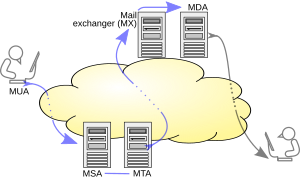PHPMailer is a code library to send (transport) emails safely[8] and easily via PHP code from a web server (MUA to the MSA server).
 | |
| Original author(s) | Brent R. Matzelle[1][2] |
|---|---|
| Developer(s) | (2001-2007) Brent R. Matzelle (2007-2012) Andy Prevost[3][4] |
| Initial release | 2001 |
| Stable release | 6.9.1[7] |
| Repository | |
| Written in | PHP |
| Operating system | Cross-platform |
| Available in | over 50 languages |
| License | LGPL |
| Website | github |

Sending emails directly by PHP code requires a high-level familiarity to SMTP protocol standards (RFC 821, 2821, 5321) and related issues (such as Carriage return) and vulnerabilities about email injection for spamming. From 2001 PHPMailer is one of the popular[9][10] solutions for these matters on PHP.
Features edit
Partial list of features:
- Plain text, HTML and multipart batched files
- SSL and TLS (Secure Sockets Layer and Transport Layer Security)
- SMTP, Qmail, POP3
- Debugging system
- PHP sendmail and mail methods
- IDN
- DKIM
History edit
- PHPMailer was originally written in 2001 by Brent R. Matzelle as a SourceForge project.[1]
- Andy Prevost (codeworxtech) took over the project in 2007.
- Became an Apache incubator project on Google Code in 2010, managed by Jim Jagielski.[11]
- Marcus Bointon (coolbru on sourceforge) contributed to the project and joined as an admin in July 2012.
- Marcus created his fork on GitHub.
- Jim and Marcus decide to join forces and use GitHub as the canonical and official repo for PHPMailer.
- PHPMailer moved to the PHPMailer organization on GitHub.
- Late 2016, a serious security flaw was discovered in PHPMailer,[12][13] that had to be patched twice.[14]
Popularity edit
Worx International Inc claimed in 2009[15][16] that: "PHPMailer continues to be the world's most popular transport class, with an estimated 9 million [message user agents] worldwide. Downloads continue at a significant pace daily."
PHPMailer sends an SMTP extension command with the sent emails as below which can be used to get the usage report of PHPMailer on the ESPs (Email Service Providers):
X-Mailer: PHPMailer 5.2.13 (https://github.com/PHPMailer/PHPMailer)
This SMTP header may differ for different versions of PHPMailer, and can also be suppressed or modified by PHP code. It also comes with Integrated SMTP support which means you can send emails without a local mail server.[17]
References edit
- ^ a b "PHPMailer – A full-featured email creation and transfer class for PHP". GitHub. 21 November 2021.
- ^ https://www.linkedin.com/in/bmatzelle [self-published source]
- ^ codeworxtech
- ^ codeworxtech
- ^ jimjag
- ^ coolbru
- ^ "Release 6.9.1". 25 November 2023. Retrieved 19 December 2023.
- ^ It is involved in sending emails safely without Email injection risk (not the html purification which is to prevent XSS)
- ^ Worxware claims 9 million MUA use PHPMailer: Frozen web page for the update Dec2013 on phpmailer.codeworxtech.com
- ^ "PHPMailer for e-mail sending support" in the requirements of Mantis Bug Tracker
- ^ "Google Code Archive - Long-term storage for Google Code Project Hosting".
- ^ Cimpanu, Catalin (27 December 2016). "Millions of Websites Vulnerable Due to Security Bug in Popular PHP Script". Bleeping Computer. Retrieved 14 February 2024.
- ^ Umbelino, Pedro (25 December 2016). "Santa Knows If Your Contact Form Uses PHPMailer < 5.2.18". Hackaday. Retrieved 14 February 2024.
- ^ Cobb, Michael (4 May 2017). "Why did the PHPMailer library vulnerability have to be patched twice?". TechTarget. Retrieved 14 February 2024.
- ^ http://phpmailer.codeworxtech.com
- ^ Frozen update
- ^ "What is PHPMailer and how does it work with WordPress?". Blogies Tools. 11 September 2021. Retrieved 24 October 2021.